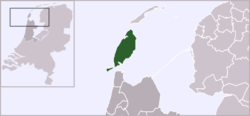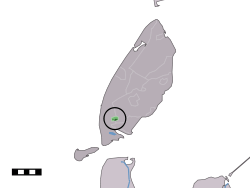Den Hoorn, North Holland
Den Hoorn is a village in the Dutch province of North Holland. It is a part of the municipality of Texel, and lies about 9 km north of Den Helder.
Den Hoorn | |
|---|---|
 The town centre (dark green) and the statistical district (light green) of Den Hoorn in the municipality of Texel. | |
 | |
| Country | Netherlands |
| Province | North Holland |
| Municipality | Texel |
In 2001, the town of Den Hoorn had 443 inhabitants. The built-up area of the town was 0.15 km², and contained 214 residences.[1] The statistical area "Den Hoorn", which also can include the peripheral parts of the village, as well as the surrounding countryside, has a population of around 470.[2]
History
A prominent feature outside the modern core of the village is the white (Dutch reformed) church, built in the fifteenth century to replace a wooden chapel demolished in 1409. The new church was ready in 1425 and 25 years later received a tower which would later also serve as a beacon. The three signal beacons for shipping were replaced only in 2008 by a modern tri-colour signalling device featuring oscillating green light on one side, an oscillating red light on the other side and a white light in the middle.
Parts of the church were rebuilt in the seventeenth century. The church bells date from the fifteenth century, but during the Second World War, with the country under occupation, the order was received to remove the bells and convey them, along with the bells from more than 200 other Dutch clock towers, to Germany. The bells were duly demounted from the tower and shipped along the coast towards Germany. However, near Urk the ship sank and after the war the bells from Den Hoorn were salvaged and returned to the tower.
The location of the church outside the built up part of the village is striking. In the past Den Hoorn was much larger and the church was surrounded by buildings, but major reductions in shipping transport led to many houses in the village being abandoned and subsequently destroyed, leaving the church looking isolated.
Since 1962 boats to Texel have docked at 't Horntje, very close to Den Hoorn which is near the southern tip of the island. Den Hoorn is also home to two national institutes. These are the Royal Dutch Institute for Maritime Research (Nederlands Instituut voor Zeeonderzoek / NIOZ) and a short distance away Alterra, previously and more instructively known as the Institute for Woodland and Rural Environment Research (het Instituut voor Bos- en Natuuronderzoek / IBAN)
References
- Statistics Netherlands (CBS), Bevolkingskernen in Nederland 2001 Archived March 19, 2006, at the Wayback Machine. (Statistics are for the continuous built-up area).
- Statistics Netherlands (CBS), Statline: Kerncijfers wijken en buurten 2003-2005 Archived 2006-07-24 at WebCite. As of 1 January 2005.